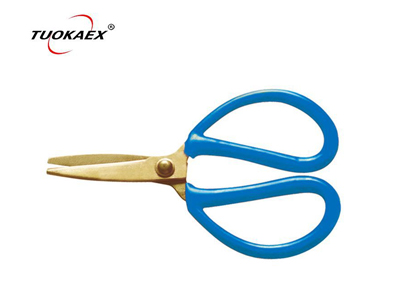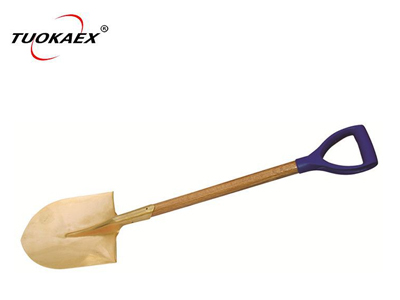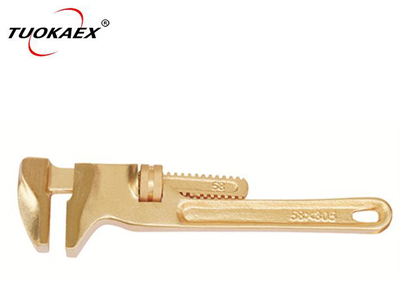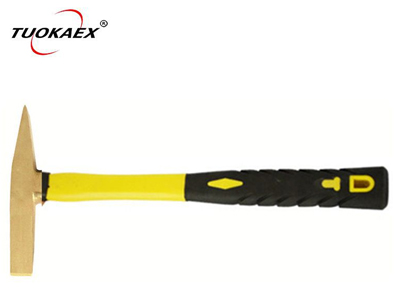How Do You Know When You Should Use Non-sparking Tools?
Many business operations rely on a variety of tools to perform daily operations. Some use heavy mechanical tools or manufacturing equipment. Others rely on a variety of tools to keep their facilities clean.
Not all tools offer non-sparking options, but if your business deals with the inherent fire hazards associated with flammable, combustible, or explosive materials on-site, you may be interested in non-sparking tools that reduce risk and increase operational safety. In fact, you may be required by law to use non-sparking tools whenever possible.
242 Non-Sparking Cutting Shears
Naturally, you want to ensure the safest working environment for your employees and, in some cases, for the public. For business owners who handle hazardous materials, this is as much a legal issue as it is an ethical one.
The question is: How do you know when you should use non-sparking tools? Here are some situations where the use of non-sparking tools is recommended.
According to OSHA's recommendations
The Occupational Safety and Health Administration (OSHA) is concerned with the health and safety of employees in the workplace and during the work process. The organization is responsible for setting health and safety standards for all aspects of operations and enforcing regulations designed to ensure worker safety.
It's no surprise, then, that OSHA has guidelines for the use of spark-free tools in the workplace. In the "Hand and Power Tools" manual, OSHA provides the following helpful information.
200 Non-Sparking Shovel
"Iron or steel hand tools may produce sparks, which may be a source of ignition around flammable materials. If this hazard exists, use fire-resistant floral tools made of non-ferrous materials for storage or use where flammable gases, highly volatile liquids, and other explosive materials are present."
Non-sparking tools can include a variety of products, such as wrenches, pliers, and screwdrivers, as well as items such as shovels and brooms. Any tool with a metal component can produce sparks, but tools made of non-ferrous metals are more likely to produce "cold sparks," if any, and their heat is so low that even substances such as carbon disulfide are unlikely to ignite with a very low ignition point.
If you are unsure whether your workplace requires spark-free tools, it is best to talk to an OSHA representative to determine your responsibilities. Failure to comply with OSHA regulations may result in fines or other consequences, so it is best to go directly to the source.
127 Non Sparking Monkey Adjustable Wrench
When working with flammable substances
Whenever you work with flammable or combustible materials, you need to do everything possible to avoid sparks that could cause a fire hazard. Even if you follow all applicable rules and regulations regarding the safe storage of hazardous chemicals or other flammable substances, there is always a fire hazard. In such cases, it is best to use non-sparking tools as an extra precaution, whether or not OSHA requires you to do so. Worker safety and facility safety are critical, and non-sparking tools help reduce the risk of fire.
When working with explosive substances
Although there are significant differences between flammable and explosive substances, sparks are dangerous around both types of materials. Just as you want to avoid potential fire hazards, you may prefer not to deal with explosions in the workplace. For this reason, spark-free tools are essential for businesses that store and handle explosive materials.
190 Non-Sparking Chipping Hammer
When working in confined spaces
You may not understand why there is any difference in safety standards between open spaces and confined spaces, but confined spaces can be more dangerous, especially in the event of a fire. This is partly because fires can spread more quickly in confined spaces, especially those that are cluttered and unorganized.
If you happen to store hazardous or flammable materials in a confined space for safety and security purposes, a fire can be catastrophic, even if the space is well-ventilated and has additional safety features such as fire sprinkler heads. In addition, confined spaces can be difficult to maneuver, potentially increasing the risk of workers being trapped in an emergency situation and creating difficulties for emergency responders attempting to rescue them.
In other words, you need to be extra careful when it comes to confined workspaces, especially if flammable, combustible, or explosive materials are present. Non-sparking tools will help ensure the safety of workers and your facility.
Looking for quality non-sparking tools, Tuokai safety tools is one of the trusted manufacturers of non-sparking tools. The company has a complete set of investment casting production lines of international advanced equipment, explosion-proof tools, steel tool forging production lines, mechanical finish machining production lines, and product packaging test production lines, ensuring the quality of products shipped to meet the requirements of the technical standards. Our company has non-sparking tools for sale, such as nonsparking cutting shears, nonsparking monkey adjustable wrench, non sparking chipping hammer, non sparking shovel,non sparking pliers, welcome to consult!
The source is from here.




评论
发表评论